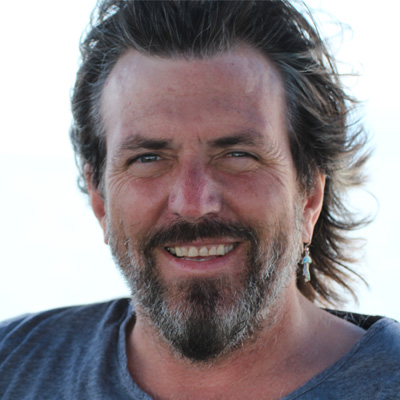Using innovative tools to identify viruses and develop novel therapeutics
The most abundant and diverse life form on earth are viruses that infect bacteria, also known as phage. They are important in every ecosystem, from our lungs, gut, mouth, and skin to coral reefs. Building on this observation, Dr. Forest Rohwer, Professor of Biology is pioneering the exploration of viruses all over the world. His novel research has identified a new, phage-based immune system that has the potential to dramatically improve human and non-human health.
Dr. Rohwer directs a large interdisciplinary team of students, postdoctoral fellows, technicians and researchers that collaborate with groups of engineers, mathematicians and doctors. The Rohwer lab has developed some of the world's more sophisticated expeditionary science practices to study the most remote coral reefs on the planet. To do this, they developed near real-time protocols for sequencing viruses and other microbes at sea. Using the same approaches, the Rohwer is developing personalized medicine approaches.
Current research includes:
- Cystic Fibrosis Characterization - Patients suffering from cystic fibrosis go through repeated disease flares. The causes of these disease flares are highly diverse and often fatal. Using massive sequencing and novel bioinformatics, Dr. Rohwer and his team are diagnosing these disease flares and helping determine the best treatments. They are currently reducing the total time for this process to 24 hours. When completed this will be the first personalized medicine approach for cystic fibrosis and applicable to other diseases.
- Conserving Coral Reefs - Coral reef are declining around the world. Dr. Rohwer and his team study how viruses impact the health of coral reefs. This research has shown that the root cause of coral reef decline is linked to how viruses respond to different stressors. By categorizing the world’s reefs into different health states based on their viruses, Dr. Rohwer and his team can identify the trajectory of a reef’s future,. Though restoring marine life poses many challenges, they’re currently utilizing this fundamental knowledge to experimentally develop coral reef treatments.
- Immunity System Discovery and Bacteriophage Adherence to Mucus (BAM) - Dr. Rohwer’s work to categorize marine viruses led to the development of metagenomics, one of the fastest growing fields of biological research. Using metagenomics, he has discovered a completely new immune system. Dr. Rohwer and his team originally discovered this immune system—in which phage protect organisms against invading bacteria—in coral reefs, and found that it exists in humans too. They expect they will be able to manipulate this immune system and improve both reef and human health. The development of these findings fundamentally work across most fields, and provides a new place for novel therapeutics.
- Characterizing All Viruses on Earth - Most of the viruses on our planet have never been observed. Dr. Rohwer and his team want to sample representatives of all viruses in the world, and characterize them in the first “world map” of organisms. They are developing innovative tools to gather environmental samples and obtain biological and chemical data in their lab. Their collaborators then interpret the large data sets they create. Though seemingly ambitious, Dr. Rohwer and his team’s novel tools will enable them to complete the first global survey of viruses within five to 10 years.

Bio
Dr. Forest Rohwer is a natural born scientist. His mother runs a lab and her father mixes biochemistry, physiology, and computer models as an applied animal nutritionist. Classically trained as an immunologist studying human viruses, he heard a lecture in which he learned of the many viruses in the ocean that were essentially completely unknown. This would change the course of his work.
As he was finishing his Ph.D. and moving into his postdoctoral studies, Dr. Rohwer began his marine virus research. He started working on viruses found on coral reefs. He posed an important question, “How can we figure out what those viruses are and what they are doing?” To answer this, he invented new techniques, which are now collectively called metagenomics. This novel approach showed that most of the planet’s diversity is viral, a notion that challenges a lot of previous and current basic biological assumptions. His present research projects are based on the premise that viruses are the most successful life forms on the planet and by understanding and manipulating them, we can improve ecosystem and human health.
Dr. Rohwer grew up hunting and fishing, and has always loved the outdoors. When he’s not in the lab, he enjoys archery, scuba diving, going to brew pubs (typical for a San Diegan), and traveling both with his family and on coral reef expeditions.
In the News
Publications
Awards
Listed in The World's Most Influential Scientific Minds, 2014
Thomson Reuters
American Academy of Microbiology Fellow, 2013
American Academy of Sciences Fellow, 2006
Patents
High-throughput methods for quantifying cells in environmental and laboratory samples
U.S. Patent No.8,563,251 B2: "High-throughput methods for quantifying cells in environmental and laboratory samples". Issued October 2013.


